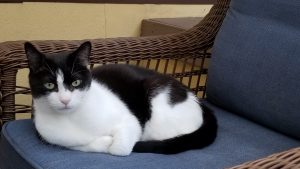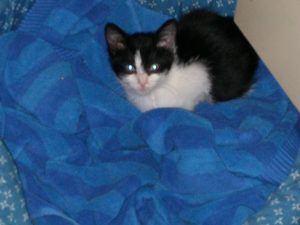
Pierre le Chat, 2003-2017
My cat died two weeks ago. I know that not everyone understands the curiously powerful emotional bond some folks forge with a pet, but I’ve always looked at it this way: These animals don’t choose to live with us, we do that for them for our own selfish reasons. In exchange, we owe them a good life. We owe them the basics, plus affection. I’ve always thought my role was to ensure they were never afraid, or unhappy.
And for 14 years, we managed that for Pierre. For 14 years that cat wanted for nothing, never doubted that he was loved, and knew nothing but security and the curious joys of a routine observed obsessively. And then we hit the Last Mile problem.
####
Pierre wasn’t my first cat to die. When I was a kid, my brother and I rescued a gray and white cat from a neighbor’s house; she was headed to euthanasia because their son had moved out and left the cat behind and they didn’t want her. So my brother and I took her in. We named her Missy, and Missy spent every night in my bed, purring away as if she knew she’d been saved. Ten years later, I was in college and Missy’s kidneys failed her, and I selfishly let my mother take care of her and when the time came to put her down I visited her at the Vet, scratched her ears, and left, and I look back now and feel like 19-year old Jeff was a coward.
20 years later, another cat had a stroke and literally died right there in the room. It was a terrible shock and we cried, but at least we thought he simply died. No suffering.
A few years later another cat hurt his paw, and had to have a claw amputated. He died on the operating table. Just never came out of the anesthesia. While I was bothered that his last memories were filled with fear and confusion being in a place he hated with people he didn’t know, at least I thought he died while unconscious.
####
Pierre had heart disease. Heart disease in cats is tough, because they often show zero symptoms. Pierre had lost weight, but he’d been fat and I’d spent years trying to find a diet approach to get him slimmed down a little, so for a long time I thought I’d simply finally hit on the right dietary approach. He wasn’t diagnosed until 2 months before he died, and throughout those 2 months he still seemed more or less normal. He was hungry, affectionate, and occasionally playful. We thought maybe the medicine would make him feel stronger and he might gain back some weight. We thought it was reasonable, based on his behavior, that he might go another few years on the meds.
Then one night he couldn’t go to the bathroom, and started breathing very heavily, and wandering the house restlessly. Twelve hours later we made the painful decision to put him down. His last few hours were awful; this roly-poly, delightful cat just lay on the floor, gasping, foaming, staring. And that’s the Last Mile problem: We gave Pierre 14 great years. But his last 12 hours were awful. He didn’t die in peace, in a warm bed surrounded by those who loved him. He died in a exam room, with an IV line in him, afraid and in much discomfort. We were there petting him, but I’m not sure how much that helped.
####
As you get older, and enough people and pets die on you, you start to realize that this is true for most of us. We have control over our lives and can make ourselves happy and comfortable until the Last Mile, when it all goes to shit. When the end comes, it often comes suddenly, surprisingly, and with a violence and pain that is shocking to all involved. As a kid I was taught by TV and movies that people tended to die in ways that allowed for catharsis—for final speeches, for confessions, for closure.
Maybe this happens sometimes; I mean, apparently people also sometimes spontaneously combust, so anything is possible. My experience is that this doesn’t happen. Death comes and it’s chaos and confusion and before you know it you’re getting a call from the hospital or the palliative care place and you’re rushing to get there before the end. Or you’re being told by a veterinarian that you should seriously consider putting your cat out of its misery. At that point, you have choices, but no control: Every choice leads to more suffering, except one.
You can control an animal’s existence for optimal comfort, health, and affection, until you can’t. The Last Mile will always defeat you. Someday the Last Mile will kick in for me, too. I’ll be able to compensate for life’s little tricks with medicines, therapies, and lifestyle changes, until I can’t. And the Last Mile will be as terrible for me as it for every other creature.
####
Life goes on. We adopted a new kitten in honor of our departed buddy, as we’ve done before, seeking to convert grief into a small, good thing. This kitten has a Last Mile waiting for it as well, but hopefully not any time soon. In the mean time, I will write novels and take trips and eat great dinners, I’ll kiss my wife and shake hands and hug friends, I’ll watch great movies and laugh at great jokes. Life goes on. Until it doesn’t.

Pierre, February 2004

Losing a pet sucks so much. So sorry for your loss. : (
…I’m volunteering at the animal clinic starting this month. Lots of cool cats…and a few dogs. Can’t afford an animal, but getting my fix in other ways. You will write about it – if you haven’t already. Something in the way of sentimental historicism perhaps?
“These animals don’t choose to live with us, we do that for them for our own selfish reasons. In exchange, we owe them a good life.” – well said! Now I don’t need to feel guilty about spoiling my dog.
And overall a really compelling piece. Kudos.